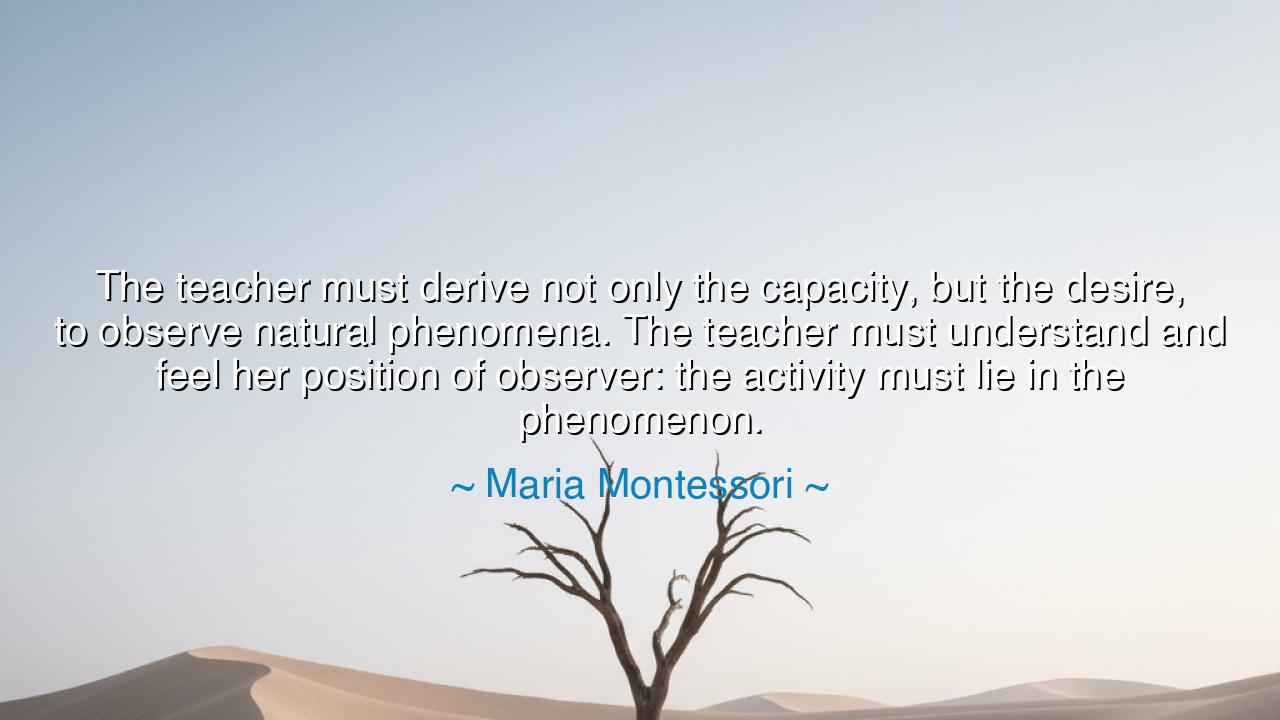
The teacher must derive not only the capacity, but the desire
The teacher must derive not only the capacity, but the desire, to observe natural phenomena. The teacher must understand and feel her position of observer: the activity must lie in the phenomenon.






Hear the luminous teaching of Maria Montessori, who declared: “The teacher must derive not only the capacity, but the desire, to observe natural phenomena. The teacher must understand and feel her position of observer: the activity must lie in the phenomenon.” In this vision, she lifts the role of the teacher beyond that of a mere instructor of rules and facts. She calls upon the guide of children to awaken not by control, but by reverence, to stand humbly before life itself, and to let the unfolding of nature and the child’s spirit reveal their own truths.
To observe natural phenomena is not simply to see with the eyes, but to watch with patience, to listen with humility, to witness without forcing. The teacher, in Montessori’s vision, is not the master of activity, but the observer of activity. The child, like a flower opening to the sun, grows through inner laws and impulses that no command can create. The teacher’s sacred role is to recognize, nurture, and protect this growth—not to impose upon it. Thus, the activity must lie not in the teacher, but in the phenomenon of nature, of life, of the child’s unfolding mind.
Consider the example of Socrates in ancient Athens. He did not fill his students with answers but questioned them, observed their reasoning, and guided them toward discovering truth within themselves. His greatness was not in proclaiming doctrine but in awakening thought, respecting the natural activity of the soul. In this way, Montessori stands in the same lineage: her teacher, like Socrates, must possess not only the ability but the desire to observe, to let the light come from within the student rather than from without.
History also gives us the image of Galileo, who turned his telescope to the skies. He did not tell nature what it must reveal; he observed patiently until the moons of Jupiter declared themselves. So too must the teacher be like Galileo: not demanding of the child what is not there, but waiting until the truth reveals itself in its own time. The child’s mind is a universe, with its own orbits, its own rhythms, its own stars. The teacher must love the watching, must be eager to discover, rather than impose.
The deeper meaning of Montessori’s words is this: teaching is not an act of dominance but of humility. To impose one’s own restless activity upon the child is to silence the miracle of growth. But to stand as an observer, watchful and reverent, is to join in the great harmony of nature itself. The teacher is a gardener, not the sun; a guardian of soil and water, not the flower’s inner law of growth. The activity must lie in the phenomenon—the life unfolding in front of us—while the teacher rejoices in beholding it.
The lesson for us is clear: whether we guide children, apprentices, or even ourselves, we must practice the art of patient observation. Do not rush to command, to explain, to direct. Instead, cultivate the desire to observe, the joy of watching life reveal its secrets in its own rhythm. In this way, we honor both the learner and the truth, for we recognize that life itself is the greatest teacher, and we are but its witnesses.
So I say to you: remember Montessori’s wisdom. “The teacher must understand and feel her position of observer.” Take this not only into the classroom, but into your life. When you guide others, step back. When you seek wisdom, first observe. When you nurture growth, let the activity rest in the living phenomenon, not in your restless will. For to observe with reverence is to align yourself with nature’s law, and to witness the unfolding of truth is to participate in the eternal rhythm of creation.






AAdministratorAdministrator
Welcome, honored guests. Please leave a comment, we will respond soon